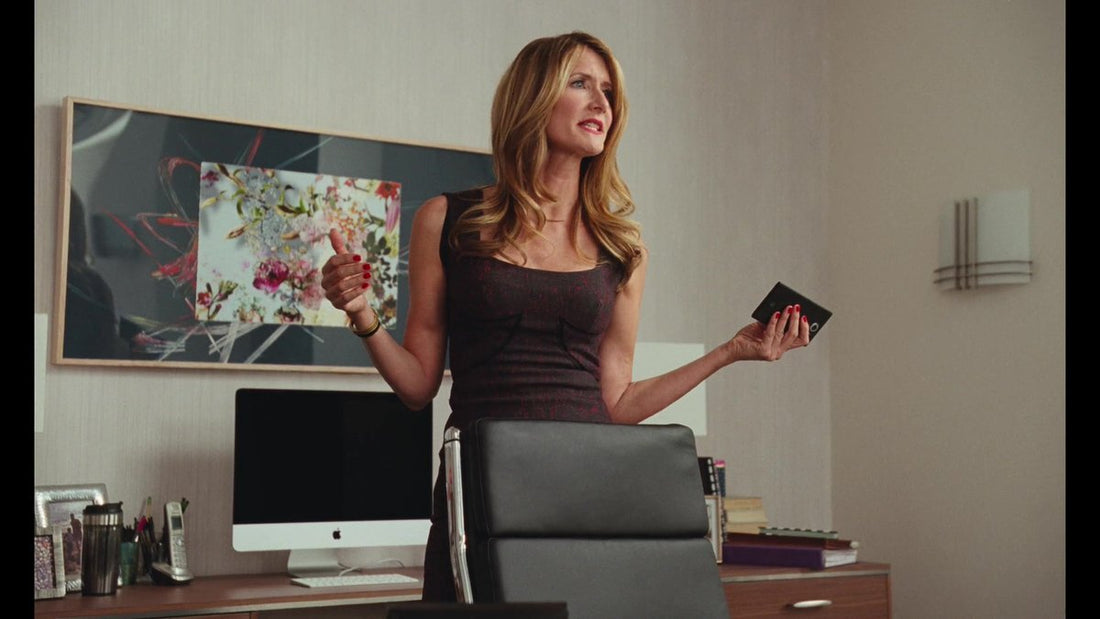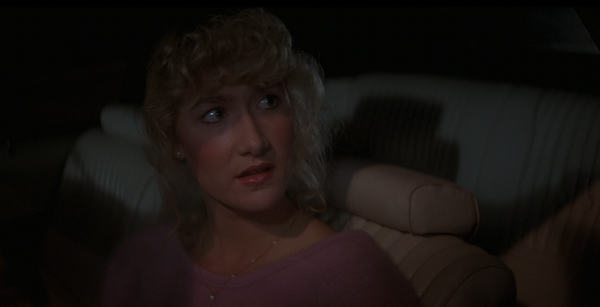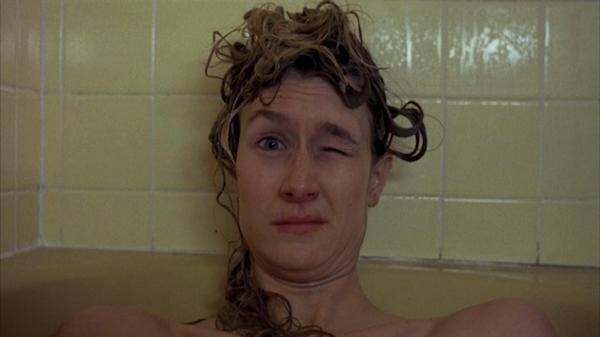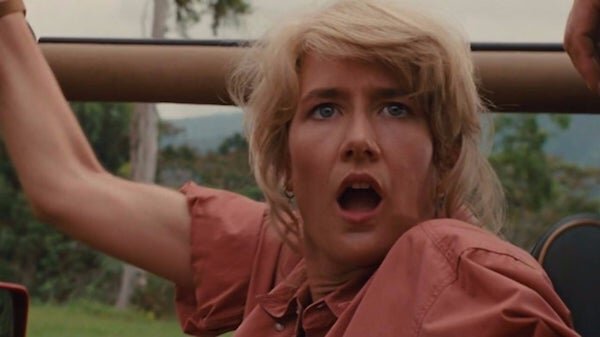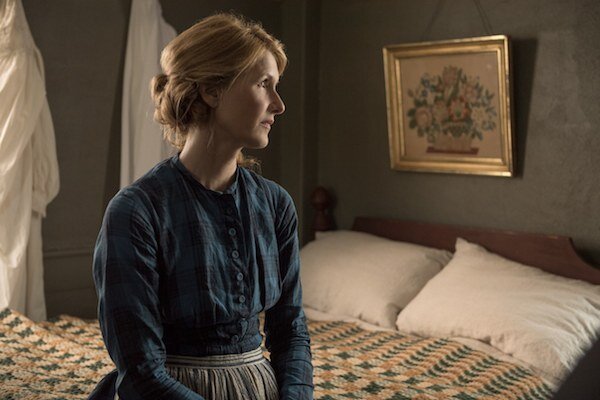There seems to be one actress on everyone’s mind this awards season. Laura Dern has played blistering mothers and lawyers, basking in the spotlight. But she earned her right to take centre stage, perfecting paradoxes and proving men that she could save them too. Eve Allin looks back through Dern’s twisty onscreen history.
Laura Dern’s Nora stands tall, in a tight black dress, legs spread in a rooted stance telling Scarlett Johansson’s character, Nicole, that we accept bad fathers, but we will never accept bad mothers. Her face is gentle, her voice is soft. A high-powered lawyer with the best biscotti in the city, Nora eschews simple characterisations and embraces paradox. Dern is at ease with herself inside this character – she is not just speaking to Nicole, she is speaking outwards. Laura Dern tells us that we are allowed to be messy and angry and lonely and ambitious all at once, and we are also allowed to be feminine and introverted and beautiful and in need of love.
In 2019, three women on screen stuck with me; Renata (Big Little Lies), Marmee (Little Women), and Nora (Marriage Story). These three roles mount the crest of Laura Dern’s rich body of work. Dern has contributed to a resurgence of women at the forefront of television with characters full of depth and sincerity, most notably in Reese Witherspoon’s explosive Big Little Lies.
Renata, Marmee, and Nora escape their stereotypes by embracing them. Renata and Nora are high powered, fiercely protective, dramatic women. Marmee is the opposite – poor, undramatic, and endlessly kind. And yet, Laura Dern ties them together, and gives three emotionally charged and independent mothers who are never solely defined as such. Her craft comes in actively searching for the loopholes in those domestic tropes.
Reaching backwards through her career, there are moments pointing towards how Laura Dern created a body of work culminating in 2019’s intimidating trifecta of characters. Whether in Citizen Ruth, Jurassic Park, or Blue Velvet, Laura Dern’s characters have always carried defiance within them.
Her beginnings stem from collaborations with David Lynch and the surreal musicality of his filmmaking. Blue Velvet is a dark and dangerous film that seems completely at odds with Laura Dern’s sweetness. Her genuine, gentle nature couldn’t be further away from Lynchian surrealism. The film centres around Kyle MacLachlan’s Jeffery Beaumont who discovers a severed ear in a field and enlists the help of Dern’s character, Sandy Williams, to solve the mystery. Lynch had never seen Dern act when he invited her to audition for Sandy, yet the sweet, strange, lofty character she inhabited would become central to the film’s esoteric tone.
The radical juxtaposition of violence, sexuality, and horror is made strange by MacLachlan and Dern’s muted, strange performances. When Laura Dern rose to prominence after this film, it was not as a Hollywood starlet, or a character actress, but something else entirely. The eccentricity of Lynch’s filmmaking only served to enhance Dern’s natural charm, focusing on her whispered lines and wandering gaze. Blue Velvet eluded categorisation, and by proxy so did Dern.
After appearing in Martha Coleridge’s Rambling Rose and Alexander Payne’s Citizen Ruth, it was then that Laura Dern cemented herself as an actress who defies easy categorisation. In Citizen Ruth she plays Ruth Stoops, a criminally neglegent drug addict who finds herself at the centre of a pro-choice battle. Submerged in yellowing bath water, Stoops stares right into the camera, hair wet and ragged around her. She winks at us, one eye at a time – it becomes clear that this potentially unflattering portrait is drawn with care and humour. Laura Dern’s creation of a woman who is morally ambiguous marked out a precedent for characters like Renata and Nora.
When she was cast in Steven Speilberg’s Jurassic Park, Dern found international fame. Her double denim clad archaeologist Ellie Sattler is introspective and brave. Speilberg’s cult film traces a disastrous weekend at Jurassic Park, where dinosaurs have been brought back to life. At the moment where power fails in the park and a storm rages, Sattler’s partner Grant (Sam Neil) as well as the rest of the team, are stranded next to the cage of a Tyrannosaurus Rex. When she realises they’re in trouble, she sets out to bring them back, saving the suave Malcolm (Jeff Goldblum) from impending destruction, and inverting the long-held formula of the damsel in distress. Instead of being saved, Ellie leads the rest of the men in a rescue mission. Dern paved the way for women to exist and survive in blockbusters, stepping into a role usually reserved for fathers, husbands, and knights.
With each performance, Laura Dern forges new pathways for women and their messiness. In an interview with The Guardian earlier this year, she said, “I love playing characters who lead with their desperation and their rage, and their ferocity and their loneliness and their vulnerability, because these were all things that when I started acting weren’t necessarily on the page.” Dern revels in unpeeling a character’s layers, until she finds a sticky, unflattering centre.
At first glance, Laura Dern’s Marmee is open-hearted and sweet, embracing her daughters in tender hugs, swathed in love and warmth. She is restrained and upright, until she’s around her daughters, when her shoulders visibly lower, arms outstretched. Yet what lingers beneath this potentially saccharine surface is the vulnerability and loneliness that Dern talks about – Greta Gerwig gives Marmee moments of solitude that articulate her isolation amongst her daughters. It is Laura Dern’s ability to balance Marmee’s love and anger that creates her singular performance, and gives such deep meaning when she says, “I’m angry nearly every day of my life”.
In Big Little Lies, Laura Dern plays Renata, one of five women at the centre of what is ostensibly a muder mystery – but unravels itself into a series that examines wronged women, trauma, and antagonistic friendship. Renata is a prickly and protective mother, umbrella parenting her daughter to such an extent that she gets into a fight at her school. She is a career-driven lawyer who has built herself from the ground up, and is constantly looking over her shoulder for anyone who might threaten her throne. Renata’s ferocity is captivating and uncomfortable. She yells at her husband in bright red pant suits before yelling at teachers in glittering jackets and an eye patch.
Renata is erratic, loud and emotional but Dern plays her with respectful sensitivity. The power in the role comes from the body, from her heart and her gut. Comparing Renata’s power stances, pointed fingers, and exasperated outbursts with Marmee’s instinctual touch and tactile gentility removes any doubt that Laura Dern acts with astounding versatility. The strength in these characters evokes her earlier performances as a young woman.
When this strength is paired with her voice; the strangeness and softness of it, something new happens. From Dern’s lilting, shadowy prophecy of robins in Blue Velvet to Marmee’s prophecy of “natures too noble to curb, too lofty to bend'', these moments lean into her tenderness. At the core of each portrayal is a delicacy, impossible to ignore. She deftly chooses when to gift us with finely delivered exaggeration, hinting at a playful absurdity. Nora says it best: “The basis of our JudeoChristian Whatever is Mary Mother of Jesus and she’s PERFECT”. And yet, Dern consistently roots her craft in precision, weaving characters with razor-sharp clarity.
Noah Baumbach creates a succinct analogy for Dern’s whole oeuvre in Nora – she is a protective mother but not too protective. Forever assertive and glamorous, the bitterness of her own divorce never overcomes her. Nora exemplifies the way that Dern’s characters often toe the line of what is accepted by hegemonic cultural narratives. Her mess never spills over, it is contained to the boxes drawn around her.
Laura Dern’s roles defy expectations, but for the most part her early roles relied on male directors framing her within their worlds. Whether it is Lynch’s surrealism, Speilberg’s epic theatricality, or now Baumbach’s love story in reverse, Laura Dern has been gifted the chance to be paradoxical by the men writing the narratives.
In the early stages of her career, Speilberg and Lynch were seen to be taking a risk on her. Her defiance of genre was led by those directors, predicated on an imbalance of power – the learnt narrative is that they chose her, not the other way around. This is not to say she hasn’t given voice to those previously silenced, but instead to recontextualise her ability and opportunity to elevate those voices.
Although Dern’s consistently deep characters are embraced because of their complexity, not in spite of it, she still operates within a patriarchal framework, where women are often aesthetic choices. We can only stomach these women when they are played by someone so dazzling. In the eyes of Hollywood, she is traditionally attractive, accepted as an exception who can challenge stereotypes while remaining palatable.
Dern is accepted by the Academy, the Golden Globes, the Emmys and beyond because she presents difficult women in an uncomplicated shell. Her performances give just enough danger to feel radical, but are steeped in predetermined acceptance from the men who took those first risks on her. Dern’s talent should not justify the rarity of these roles, instead, it should do exactly the opposite – act as a gateway for widening the lens.
Eve Allin (@EveAllin) is a freelance writer and theatre producer based in London.
Our LAURA DERN t-shirt is available to purchase here. Proceeds go towards paying our writers and supporting female-led film projects.

